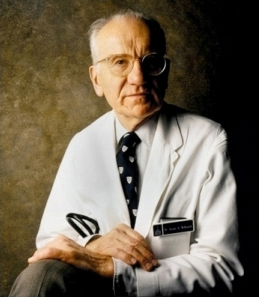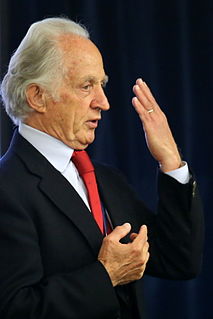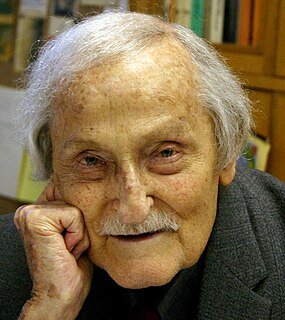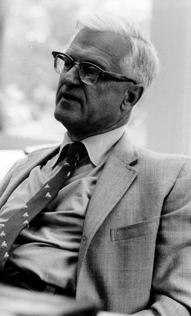Related Research Articles
Milford Howell Wolpoff is a paleoanthropologist and professor of anthropology at the University of Michigan and its museum of Anthropology. He is the leading proponent of the multiregional evolution hypothesis that explains the evolution of Homo sapiens as a consequence of evolutionary processes and gene flow across continents within a single species. Wolpoff authored the widely-used textbook Paleoanthropology, and co-authored Race and Human Evolution: A Fatal Attraction, which reviews the scientific evidence and conflicting theories about the interpretation of human evolution, and biological anthropology's relationship to views about race.

The State University of New York College at Oneonta, also known as SUNY Oneonta, is a public college in Oneonta, New York. It is part of the State University of New York (SUNY) system.

Victor Almon McKusick was an American internist and medical geneticist, and Professor of Medicine at the Johns Hopkins Hospital, Baltimore. He was a proponent of the mapping of the human genome due to its use for studying congenital diseases. He is well known for his studies of the Amish. He was the original author and, until his death, remained chief editor of Mendelian Inheritance in Man (MIM) and its online counterpart Online Mendelian Inheritance in Man (OMIM). He is widely known as the "father of medical genetics".

Rosalyn Sussman Yalow was an American medical physicist, and a co-winner of the 1977 Nobel Prize in Physiology or Medicine for development of the radioimmunoassay technique. She was the second woman, and the first American-born woman, to be awarded the Nobel Prize in Physiology or Medicine.

Janet Davison Rowley was an American human geneticist and the first scientist to identify a chromosomal translocation as the cause of leukemia and other cancers. This proved that cancer is a genetic disease. Rowley spent majority of her life working in Chicago and received many awards and honors throughout her life, recognizing her achievements and contributions in the area of genetics.

Mario Ramberg Capecchi is an Italian-born molecular geneticist and a co-awardee of the 2007 Nobel Prize in Physiology or Medicine for discovering a method to create mice in which a specific gene is turned off, known as knockout mice. He shared the prize with Martin Evans and Oliver Smithies. He is currently Distinguished Professor of Human Genetics and Biology at the University of Utah School of Medicine.
Clarence Francis Stephens was the ninth African American to receive a Ph.D. in mathematics. He is credited with inspiring students and faculty at SUNY Potsdam to form the most successful United States undergraduate mathematics degree programs in the past century. Stephens was recognized by Mathematically Gifted & Black as a Black History Month 2018 Honoree.

Phillip Vallentine Tobias was a South African palaeoanthropologist and Professor Emeritus at the University of the Witwatersrand in Johannesburg. He was best known for his work at South Africa's hominid fossil sites. He was also an activist for the eradication of apartheid and gave numerous anti-apartheid speeches at protest rallies and also to academic audiences.

Oliver Smithies was a British-American geneticist and physical biochemist. He is known for introducing starch as a medium for gel electrophoresis in 1955, and for the discovery, simultaneously with Mario Capecchi and Martin Evans, of the technique of homologous recombination of transgenic DNA with genomic DNA, a much more reliable method of altering animal genomes than previously used, and the technique behind gene targeting and knockout mice. He received the Nobel Prize in Physiology or Medicine in 2007 for his genetics work.

Sherwood Larned Washburn, nicknamed "Sherry", was an American physical anthropologist, and "a legend in the field." He was pioneer in the field of primatology, opening it to the study of primates in their natural habitats. His research and influence in the comparative analysis of primate behaviors to theories of human origins established a new course of study within the field of human evolution. He changed the field of anthropology forever and for the better with the publication of his paper The New Physical Anthropology, in 1951, in which he argued, convincingly, that human variation was continuous, and could not be broken up into discontinuous races.
A. Roberto Frisancho is a biological anthropologist and the Arthur F. Thurnau Professor of Anthropology at the University of Michigan. He is the 2008 recipient of the Franz Boas Distinguished Achievement Award in Anthropology bestowed by the American Human Biology Association. He is best known for his work on developmental human adaptation to extreme environments such as high altitudes, growth, anthropometry and evaluation of nutritional status. Specifically, he advanced the hypothesis and demonstrated that the origin of adult variability of biological phenotypic traits are function of the effects and adaptations to environmental conditions that the organism makes during the developmental stage. Within this conceptual framework, he has contributed numerous papers on bioenergetics, the nutrition and developmental determinants of pre-natal and post-natal growth including teenage pregnancy. In 2013, he received the Charles Darwin Lifetime Achievement Award bestowed by the American Association of Physical Anthropologists.
Richard Robbins is a Distinguished Teaching Professor of anthropology at the State University of New York at Plattsburgh.
Dr. Leslie Crum Aiello is an American paleoanthropologist and professor emeritus of University College London. She was the president of Axel Lennart Wenner-Gren donated Wenner-Gren Foundation for Anthropological Research from 2005 to 2017. In 2014, Aiello was elected to the American Philosophical Society. She is currently president of the American Association of Physical Anthropologists.
Clark Spencer Larsen is an American biological anthropologist, author, and educator. His work focuses on bioarchaeology, the study of human remains from archaeological settings. Although his interests span the entire record of human evolution, his research largely pertains to the last 10,000 years, a period of dynamic change in health, well-being, and lifestyle, much of which relates to population increase, overcrowding, and nutritional decline that co-occurred with the transition from hunting and gathering to agriculture, creating living conditions that humans are grappling with to the present day.
Steven J. Fliesler is an American biochemist and cell biologist, whose research has focused on how lipid metabolism supports the normal structure and function of the vertebrate retina. He currently is the Meyer H. Riwchun Endowed Chair Professor of Ophthalmology and Vice-Chair/Director of Research in the Department of Ophthalmology, Jacobs School of Medicine and Biomedical Sciences, at the University at Buffalo, The State University of New York. In 2014, he became a UB Distinguished Professor, and in 2018 was promoted to the rank of SUNY Distinguished Professor. He is the author or coauthor of more than 150 publications, including peer-reviewed scientific/biomedical journal articles, books and book chapters.
James Norman Spuhler was an American biological anthropologist who has been described as "the founder of anthropological genetics". He taught at the University of New Mexico from 1967 to 1984, where his research focused on human genetics. In 1990, he received the NAS Award for Scientific Reviewing. He died of cancer at his home in Santa Fe, New Mexico, on September 2, 1992.
Gabriel Ward Lasker was a British-born American biological anthropologist. He taught anatomy at Wayne State University School of Medicine for 36 years and served as editor-in-chief of the scientific journal Human Biology for 35 years. He was a Fulbright Scholar in Peru in 1957–58. He served as president of the American Association of Physical Anthropologists from 1963 to 1965 and received their Charles R. Darwin Lifetime Achievement Award in 1993. He also received the Franz Boas Distinguished Achievement Award from the American Association for the Advancement of Science in 1996. In 2000, he was awarded an honorary doctorate from the University of Turin. He died of kidney disease on in Detroit, Michigan, on August 27, 2002. In 2005, the American Association of Physical Anthropologists established the Gabriel W. Lasker Service Award in his honor.
Jada Benn Torres is an American genetic anthropologist and Associate Professor of Anthropology at Vanderbilt University. She serves as Director of the Laboratory of Genetic Anthropology and Biocultural Studies. Her research considers the genetic ancestry of African and Indigenous people
John A. Meacham is SUNY Distinguished Teaching Professor Emeritus at the University at Buffalo—the State University of New York. Meacham initiated the study of prospective memory, a research subject in cognitive psychology, in the early 1970s. He also argued that wisdom is a balance between knowing and doubting and that most people lose their wisdom as they grow older. Meacham edited the international journal Human Development on theory in developmental psychology; was elected a Fellow in the American Psychological Association; served as President of the Jean Piaget Society; and taught in the Fulbright program in Bosnia and Herzegovina. Earlier publications were authored as John, more recent ones as Jack.
References
- 1 2 3 "John Relethford". SUNY Oneonta. Retrieved 3 June 2017.
- ↑ Stone, Anne C. (18 January 2017). "The Gabriel W. Lasker Service Award in 2017: John H. Relethford". News. American Association of Physical Anthropologists. Retrieved 3 June 2017.
- ↑ Wilford, John Noble (7 March 2002). "A Different Take on Human Origins". The New York Times. Retrieved 3 June 2017.